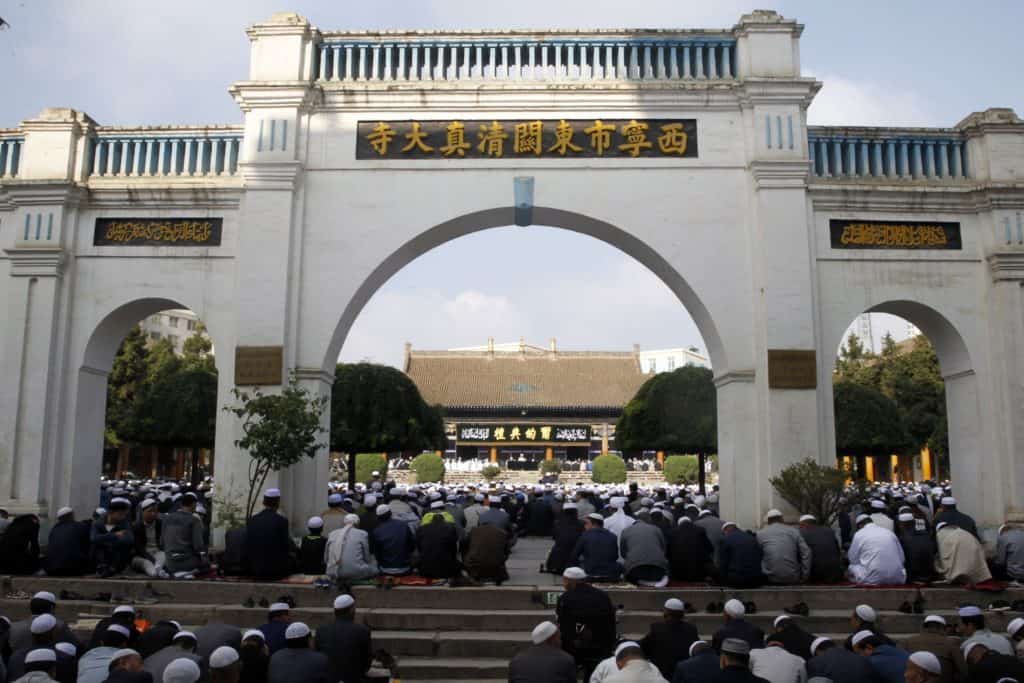Unfettered Online Hate Speech Fuels Islamophobia in China
Gerry Shih, Associated Press, April 10, 2017
The flood of angry anti-Muslim rhetoric on social media was the first sign of how fiercely the suburban middle-class homeowners in this central China city opposed a planned mosque in their neighborhood. It quickly escalated into something more sinister.
Soon a pig’s head was buried in the ground at the future Nangang mosque, the culmination of a rally in which dozens of residents hoisted banners and circled the planned building site.
{snip}
“How did things get stirred up to this point?” the imam, Tao Yingsheng, said in a recent interview. “Who had even heard of the Nangang mosque before?”
On the dusty plains of the Chinese heartland, a bitter fight over a mosque exemplifies how a surge in anti-Muslim sentiment online is spreading into communities across China, exacerbating simmering ethnic and religious tensions that have in the past erupted in bloodshed.
{snip}
Interviews with residents and an examination of social media show how a few disparate online complaints by local homeowners evolved into a concerted campaign to spread hate. Key to it was an unexpected yet influential backer: a Chinese propaganda official, 2,500 kilometers (1,500 miles) away in Xinjiang, whose inflammatory social media posts helped draw people into the streets on New Year’s Day, resulting in a police crackdown.
A stone inscription outside its gate shows the original Nangang mosque was established in the 1780s by members of the Hui minority, the descendants of Silk Road traders who settled across China centuries ago. In its present form, the mosque has served the area’s 4,500 Hui for decades, its domed silhouette partially hidden by overgrown shrubs in the countryside beyond Hefei’s last paved boulevards.
Over the past 10 years urbanization has come to Hefei, with sprawling development reconfiguring the landscape and its demographic flavor, and Hui leaders had been pushing for years to relocate their mosque to a more convenient urban location.
City planners in November finally selected a site adjacent to the newly built Hangkong New City condominiums, with its $200,000 two-bedroom units, faux-Mediterranean stylings and a Volvo dealership across the street. The project’s homeowners overwhelmingly members of China’s ethnic Han majority began complaining on China’s popular microblog, Weibo.
Some complained the mosque would occupy space promised for a park. Others warned that safety in the area would be compromised.
Others were more blunt: Han residents were uncomfortable that a center for Hui community life would be less than 100 meters (300 feet) from their building.
{snip}
The story soon caught the attention of Cui Zijian, a boyish-looking propaganda official in Xinjiang who writes about the threat of religious extremism on his Weibo account with nearly 30,000 followers.
On Dec. 16, Cui suggested homeowners lobby local officials to block the construction, adding: “If that doesn’t work, then how about pig head, pig blood.”
{snip}
Han Chinese, who make up 95 percent of the population, have long grumbled about the dozens of China’s officially recognized minority groups receiving advantages on the hyper-competitive college entrance exams or exemptions from family-size limits, but online abuse has increasingly targeted Muslims.

More than 150000 muslims attend the religious activities for their traditional Corban Festival at the more than 900-year-old Dongguan Great Mosque in Xining, Qinghai, China on 12th September 2016. (Credit Image: © TPG via ZUMA Press)
The rise in Islamophobia comes as Chinese have been buffeted by news of militant attacks in Europe, while at home, violence in Xinjiang and elsewhere has been blamed on Muslim separatists. Beijing has responded to the bloody, years-long insurgency from Muslim Uighur minorities in Xinjiang with further restrictions on Islamic expression.
{snip}
Political observers say the recent rise of a faction within the Communist Party advocating for a hard-line approach on religious affairs has coincided with the rise of government-linked commentators who openly warn about the danger of Islam.
{snip}
Tao, the 50-year old imam, recalled the day in December when he heard his mosque was suddenly the subject of thousands of posts and hundreds of comments on Weibo, a service he barely used. He soon found himself soothing local Hui who approached him, shaken by what they were seeing online.
“They said people were planning to hang a pig’s head outside our mosque. I said, ‘Then we’ll remove it.’ They said people will bury a pig’s head in the ground. I said ‘Why can’t we just dig it up?'” Tao said.
After protesters followed through with the threat at the New Year’s Day demonstration, police detained two protest leaders for two weeks and summoned others for questioning, according to residents. Since then Han indignation has gave way to quiet seething.
{snip}
During a recent visit to Hangkong New City, homeowners repeated the government’s mantra that ethnic unity was important, but complained that officials sacrificed their interests to appease a minority.
{snip}
The mosque dispute has left the city’s Hui community on the defensive, with many eager to emphasize their desire to peacefully coexist with their Han neighbors as well as their confidence in the government’s handling of the situation.
{snip}
Still Tao tries to not harbor resentment toward the Han protesters.
“I don’t blame the locals because I believe they were influenced,” he said, sitting below framed pictures of him greeting government religious affairs officials. “I want them to know Muslims are virtuous people. We are peaceful. We are reasonable. We are tolerant. And we are good Chinese.”















